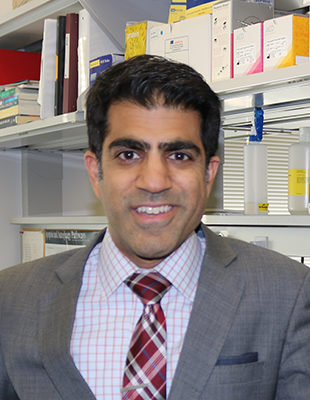
Share on facebook
Facebook
Share on twitter
Twitter
Ajay Maker has received the prestigious R37 MERIT (Method to Extend Research in Time) award from the National Cancer Institute to develop new immunotherapies that can be used to treat colon cancer and colorectal liver metastases, the second leading cancer killer in the United States.
The award is given to a select group of the highest-scoring R01-funded principal investigators to provide increased time and latitude in their research program. It will be funded for up to $2.8 million.
An accomplished surgical oncologist and associate professor of Surgery and Microbiology & Immunology at the University of Illinois College of Medicine, Maker believes that these cancers can be successfully attacked by enhancing T-cell cytotoxicity and infiltration – which has been shown to predict survival and treatment responses – and simultaneous inhibition of the body’s natural immune defense system that prevents the attack of cells, thereby causing the cancer to regress.
“A new strategy for the management of colon cancer is possible once it is discovered how to enhance immunostimulatory signals in the microenvironment and concurrently suppressing the inhibitory influences,” said Maker, a member of the University of Illinois Cancer Center’s Cancer Biology Program. “The implications of our results may improve patient quality of life and provide survival advantages over the best current surgical and chemotherapeutic strategies for this disease.”
Maker will also study how to combine a checkpoint blockade with selective delivery of the immunostimulatory cytokine LIGHT to treat human colorectal liver metastases in a pre-clinical autologous system. As a surgeon, he treats many of these patients by resecting these tumors – sometimes with removal of large sections of the liver – but “unfortunately the vast majority of patients will recur,” a condition that has inspired him to dedicate his research career to improving their outcomes.
Having received his surgical training at the Brigham and Women’s Hospital at Harvard University and Memorial Sloan-Kettering Cancer Center in New York, Maker pursued a post-doctorate in tumor immunology with Steven Rosenberg, MD, PhD, at the National Institutes of Health. He then established his Tumor Immunology Laboratory at UIC under the valued mentorship and guidance of Dr. Bellur Prabhakar, PhD, an accomplished immunologist and Associate Dean, who served as his K08 mentor and is a co-investigator on the current award. Their projects have been funded by the NCI since 2014. “Our lab would not have been successful in carrying out the proposed projects without the profound help and guidance of Dr. Prabhakar,” Maker said.
“The multi-combination therapy of LIGHT expression in liver metastases with tumor-specific oncolysis and checkpoint blockade will deliver an inventive approach that will be universally applicable from patient to patient,” Maker said. “We believe new avenues will be developed using this innovative strategy, including a better understanding of anti-CTLA4 biology that may not only enhance response rates, but also vastly increase indications for its use in previously ‘cold’ tumors, including in microsatellite stable gastrointestinal cancers.”
Over the last decade, colon cancer and liver metastases have increased in young men and women in the United States, resulting in a 1% annual increase in mortality. Maker’s research will benefit the public “because the discovery of strategies to optimize anti-tumor immune responses in colon cancer is ultimately expected to improve patient outcomes, compared to the best current therapies,” he said.
“Despite the exciting results of immunotherapy and checkpoint blockade in many previously therapy-resistant malignancies, the field is currently stymied in how to utilize this technology to battle microsatellite stable colon cancer, which accounts for more than 95% of colon cancers. As a result, our research is relevant to the National Institute of Health’s mission to develop improved immunotherapy approaches of novel combinations to define how immunosuppressive tumor promoting environments can be overcome.”
The NCI’s R37 MERIT Award is unique in that researchers may not apply for it. After submitting an R01 application, the NCI’s National Cancer Advisory Board converted Maker’s request to R37, which is guaranteed for five years and can be extended for an additional two years of funding. The MERIT Award provides awardees the opportunity for greater flexibility, creativity and innovation in their research, as well as additional time to submit renewal applications. Dr. Maker is very thankful for the support of Dr. Enrico Benedetti and the Department of Surgery, Dr. Ross and the Department of Microbiology and Immunology, Advocate Illinois Masonic Medical Center, Dr. Guilin Qiao, and his mentor Dr. Bellur Prabhakar.
